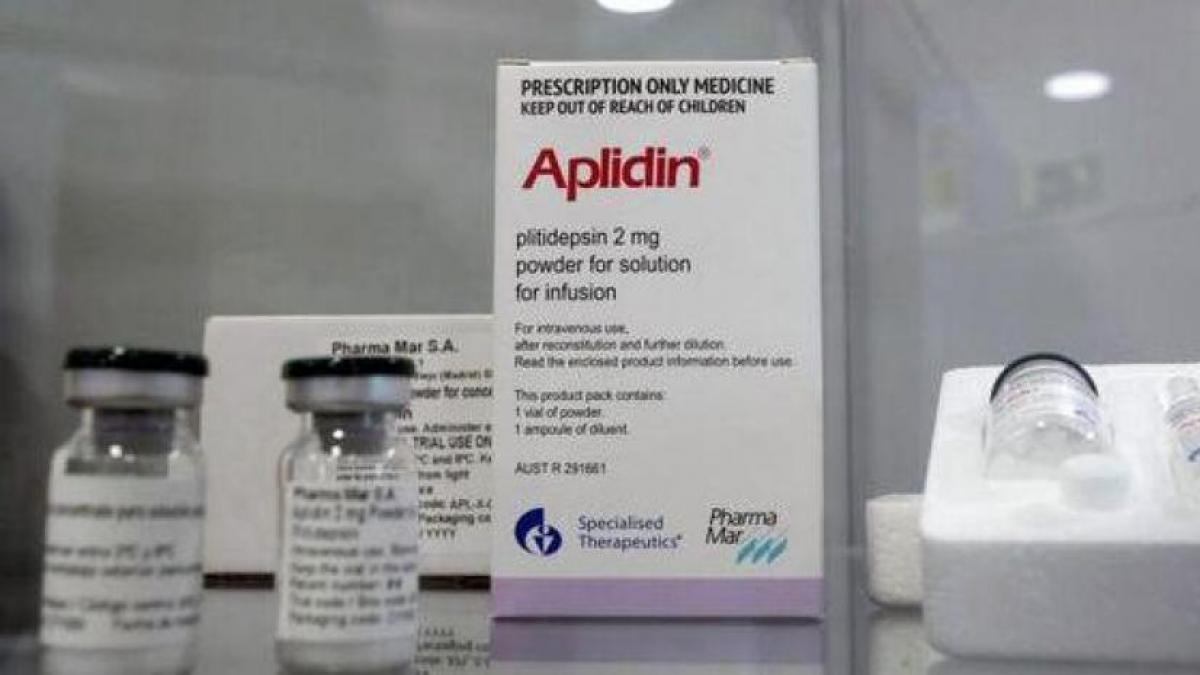COVID-19 Drugs: Cancer Drug Extracted From Sea Squirts, Aplidin, Effective Against SARS-CoV-2 Including B.1.1.7 Variant
Source: COVID-19 Drugs Jan 31, 2021 5 years, 2 weeks, 1 day, 17 hours, 39 minutes ago
COVID-19 Drugs: Researchers from Emerging Pathogens Institute at Icahn School of Medicine at Mount Sinai and University of California-San Francisco’s Quantitative Bioscience Institute (QBI) have in a new study found a exsiting cancer drug called Aplidin effective against the SARS-CoV-2 coronavirus including the newly emergent B.1.1.7 variant.

The cancer drug
Aplidin is made from the chemical compound plitidepsin was first extracted from a sea organism known as Aplidium albicans, commonly known as sea squirts. The drug has been used in the past to treat cancer and was approved in many countries including the Australian Regulatory Agency as a treatment for a type of cancer called multiple myeloma.
The study team recently published in the peer reviewed journal: Science, the results of preclinical experiments involving using plitidepsin to treat human and mouse cells infected with SARS-CoV-2.
https://science.sciencemag.org/content/early/2021/01/22/science.abf4058/tab-pdf
The study team found evidence that suggests it’s possible this drug can be used as a therapy for COVID-19.
In laboratory experiments reported in
Science on Jan. 25, plitidepsin, a compound originally discovered in a Mediterranean sea squirt, was 27.5-fold more potent against SARS-CoV-2 than remdesivir, a drug that received FDA emergency use authorization in 2020 for the treatment of COVID-19. In addition, in two preclinical models of COVID-19, plitidepsin showed a 100-fold reduction in viral replication in the lungs and demonstrated an ability to reduce lung inflammation. Additionally, they found plitidepsin to be about 100 times more potent than remdesivir in human epithelial cells.
Lead researcher Dr Adolfo García-Sastre, who is professor of microbiology and director of the Global Health and Emerging Pathogens Institute at Icahn School of Medicine at Mount Sinai told Thailand Medical News, “The current COVID-19 pandemic has created an immediate need for antiviral therapeutics that can be moved into the clinic urgently. This led us to screen clinically approved drugs with established safety profiles.”
The study team focused on how the virus uses human cells to survive and reproduce.
Dr Nevan Krogan, director of UC San Francisco’s Quantitative Bioscience Institute and one of the study’s lead researchers. Added, “That research led us to a biologic pathway, the eukaryotic translation machinery, where inhibition of the pathway showed significant antiviral activity in cell culture.”
Dr García-Sastre added, “Our previous study of the SARS-CoV-2’s interactions with human host cells led us to a protein known as eEF1A, which is involved in translating mRNA into proteins, as a potential druggable target to inhibit SARS-CoV-2 replication.”
The team upon testing plitidepsin in their experiments found that it was effec
tive in human and mouse cell lines.
Dr Kris White, who is an assistant professor of microbiology at Global Health Emerging Pathogens Institute-Icahn School of Medicine at Mount Sinai and first author of the study added, “Plitidepsin is an extremely potent inhibitor of SARS-CoV-2, but its most important strength is that it targets a host protein rather than a viral protein.”
He added, “This means that if plitidepsin is successful in the treatment of COVID-19, the SARS-CoV-2 virus will be unable to gain resistance against it through mutation, which is a major concern with the spread of the new U.K. and South African variants.”
Dr Krogan said the work is further validation of the QCRG’s focus on host proteins as a strategy to fight COVID-19 and other viral diseases.
Dr Krogan further added, “It is host mechanisms that permit the SART-CoV-2 virus to wreak havoc. By targeting host factors that enable or facilitate disease, we have the potential to have a more far-reaching impact in drug development. In this case, SARS-CoV-2 and its mutant strains, and possibly other viruses that leverage the same pathway, may also be susceptible to the same therapeutic agents that inhibit this virus–host interaction.”
However the drug would have to go through more tests to see if it’s effective against all the variants, there is some promising evidence that it would still be a good treatment option.
The study team had also tested the drug against the U.K. variant B.1.1.7 and found that it was effective, although that research has not been published yet and is available as a preprint.
https://www.biorxiv.org/content/10.1101/2021.01.24.427991v1
The study team next plans for the drug to go through clinical trials to test if it is effective in treating people with an active SARS-CoV-2 infection.
Dr Krogan added, "We need some new weapons in the arsenal," "This is by far the best thing we’ve seen."
Despite all the hype, Thailand Medical News is however skeptical that the drug will make it during the clinical trials as the drug seems too toxic for use in such a scenario.
For more on
COVID-19 Drugs, keep on logging to Thailand Medical News.
